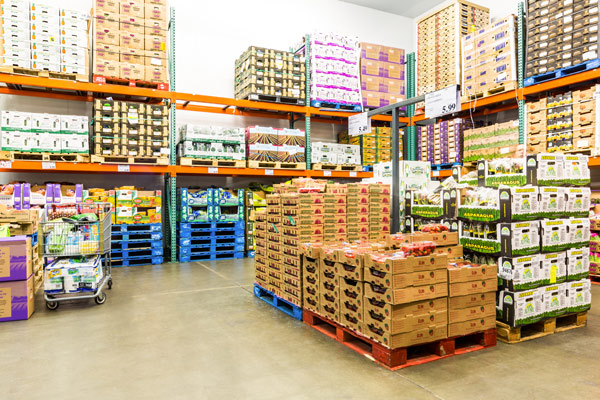The Caterer's 40 trends: supply chain
As foodservice companies consolidate and Brexit starts to bite, the supply chain is undergoing significant change and adapting to fresh opportunities and challenges
Distribution consolidation
"This gives companies leverage over larger clients and allows companies to buy better and invest in bigger, more intelligent facilities," he explains.
Meanwhile, through its new procurement initiative Foodbuy, multinational Compass is buying on behalf of smaller companies to keep competitive pricing key. On a more local level is the Tesco-Booker merger. "We don't yet know whether this is a retail play by Tesco or a foodservice play," says Backman, adding that this activity illustrates an increased focus by bigger players towards the independent sector. Traditionally, this has been served by buying groups such as Country Range or Caterforce.
"Bigger companies have been playing in this space for years, but they are increasingly looking to it because they are not making enough money in the group business," he says.
The one-stop-shop
Caterers increasingly want to buy a greater product range in one order and via one delivery, says Dipna Anand, chef and co-owner of curry restaurant Brilliant in Southall and owner of Dip in Brilliant in Chelsea. Her head chef has started working with Booker on consolidated orders, although being a specialist curry restaurant, she still sources items such as spices locally to ensure quality and consistency.
"I was reluctant to use a large wholesaler for products like meat because I was concerned about quality, but Booker uses 17 butchers, cuts to our requirements and offers a competitive price. For my time-poor head chef, one
delivery makes things easier," she says, adding that good online ordering facilities also offer caterers flexibility and speed.
According to Tim Adams, Bidfood's director of marketing and corporate sales, this demand for one multi-temperature delivery brings opportunities and challenges. "It's a real balancing act between carrying a breadth of range and items like bespoke packaging alongside specialist dietary foods. Customers want this full offer, but warehouses only have so much space."
To accommodate this, Bidfood say its hub and spoke model comes into its own. "Fast-moving lines are kept close to the customer to get that local feel and to keep mileage down between depots. Meanwhile, slower, bespoke or specialist lines are held at hub depots, which feed the spoke depots overnight," he says.
Focus on food miles and provenance
Bidfood's Adams adds that wholesale customers are becoming more interested in the traceability of produce, how it's been transported and whether it's seasonal.
"We've not been asked to report on this in the past, but in the last year more of our customers are asking for data. They want food traced from fork to farm and the naturalness of products is also becoming important," he confirms.
With Brexit looming and possible implications around import tariffs, Adams says customers should prepare and look closer to home for produce. "We are actively encouraging customers to only import products they absolutely have to. Getting caterers' minds in the right place for what may come is good practice," he says.
Horizons' Backman also feels there needs to be more activity in this area from buying groups and the bigger foodservice players. "Under the banner of provenance and ethicality, bigger companies have an advantage because they have teams of people who can work through those issues. Smaller players often have a buying group, but in the future there will have to be more activity in that area," he says.
Supply chain integrity
With ongoing pressure on costs and pricing, not to mention Brexit in the offing, food safety within the supply chain will become more pertinent.
"It tough out there and there's only going to be more competition in the future," says Steve Carter, senior trading controller at Bestway. Price, he says, will continue to be key, which is one reason Bestway is focused on building scale in the foodservice market."Bestway started as a cash and carry supplying retailers cost effectively - now we are doing the same for foodservice," he says.
However, Backman argues that increased pressure on some less-profitable businesses may mean cost-cutting in areas where there could be repercussions down the line. "Some businesses are cutting where they can, and if that means cutting a quality control team from three to one, companies will do it. The downside of that is you then risk feeding your customers horse meat," he says. Backman also adds that one of the biggest challenges in relation to Brexit will be around food legislation and its knock-on effect on compliance.
Adding value through the chain
Adding value through the supply chain has gathered pace in retail, but increasingly restaurants and chains are looking for the same level of support, whether it's from a wholesaler or supplier. "Own-label is most often being used back of house and people want a premium, branded offering front of house," says Carter.
On a regional level this can fall to smaller suppliers, with several wholesalers like Bestway and Bidfood retaining buying autonomy from depot to depot to meet that need.
"Brands are becoming more important in the value that they add, whether it's training or menu inspiration, says Carter. He calls it the "retailisation" of the foodservice market.
"We work with brands because they offer sampling for chefs or education for chefs. Customers also like brands. They don't want a tertiary own-label product on a counter - they want something that looks nice. Brands are increasingly being used to differentiate foodservice outlets," he says.
He argues that with the increasing emphasis around people eating different diets, there's also an important place for brands. "All these companies bring value because they can train chefs, for example, in catering for a gluten-free market. They are experienced in what the pitfalls are," he says. "And in return, a lot of these brands will guide customers to us as a result."
From our sponsor
"As this improved technology becomes the standard, it is people, their skillsets, engagement and relationships that will continue to give competitive advantage. However, access to the right people could be a challenge after Brexit.
"Brexit will force changes. Currently, there are extensive cross-border food supply chains that may be impacted by tariffs, custom unions and regulatory legislation.
The food supply chains that are agile and 'Brexit-ready' will be those that survive
and prosper."
Continue reading
You need to be a premium member to view this. Subscribe from just 99p per week.
Already subscribed? Log In













